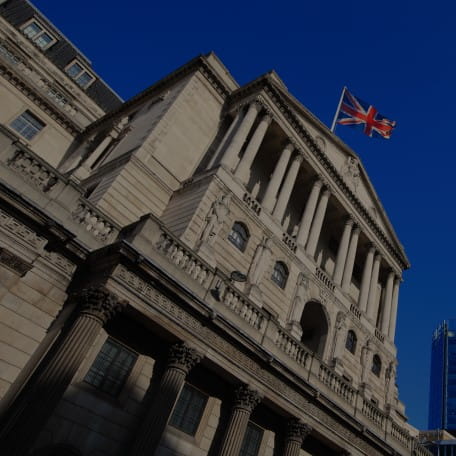The UK officially entered recession at the end of 2023 yet many forecasters seem relatively optimistic about the future – so what does it actually mean for investors and should you be worried?
According to the latest data, the UK’s economic output fell by -0.3% in Q4, following a -0.1% drop in Q3. This meets the ‘recession’ definition of two successive quarters of negative growth.1
Yet by historical standards, this recession is mild and has only been referred to so far as a ‘technical’ recession. However, it marks the culmination of stagnation in the UK economy since Brexit. It also follows the disruption caused by runaway inflation that hit a peak of 11.1% in October 2022,2 squeezing households’ spending power, and the interest rate hikes that the Bank of England initiated in December 2021 to tackle inflation.
Recessions clearly have a negative impact on business activity, so what does this latest one mean for UK investors?
Economic undulations are just one factor
From an equities point of view, it would be easy to assume that the announcement of a recession would drive down stock prices. But interestingly, the FTSE 100’s initial reaction to the official statement earlier this month was to rise slightly. The Nikkei also hit a 34-year high this month too despite Japan falling into a recession.3
So why is this? One factor potentially is the expectation or hope that the Bank of England (BoE) will cut interest rates earlier than had been expected, following the announcement that the UK is now in recession, to boost growth. Falling interest rates will often benefit shares because companies can borrow at lower rates and it is easier to manage debt levels, while as said, lower interest rates will often provide a fillip to economic activity.
However, the reality is also that the prices of equities are based on the present value of companies’ expected future earnings, and economic ups and downs represent just one of the factors in the equation. Economic output data is backward-looking and any impact on the past business activity of companies should already have been reflected in their results.
Looking historically, it is generally accepted that over the longer term, economic undulations average out on the positive side. This is a key reason why investors in markets should take a long-term view rather than trying to time markets. Furthermore, different sectors are impacted differently by recessions. For example, even in recessions, people will still need gas, water and electricity, so utility companies’ revenue streams are less affected than holiday or luxury goods companies, whose services and products would be seen as less of a priority for consumers who might have seen their incomes fall. Finally, it should also be remembered that the FTSE 100 is dominated by global companies that operate globally, so they are less vulnerable to weakness in the UK economy.
It is not yet clear whether the recession announced this month is largely surface deep or if it is signalling a deeper downturn ahead. If tough times are ahead then investors in the UK would have to weigh up the potential impact of this. However, in common with other central banks, the BoE has tried to engineer a ‘soft’ landing in its monetary campaign against inflation, and its own latest estimates are for 0.25% economic growth in 2024 (upgraded from a previous forecast of zero) and 0.75% in 2025.
Fall in rates will boost bonds
For bonds, or fixed income, mild recessions are generally seen as a positive. In recessions, bonds typically benefit from a flight to safety among investors, especially the less risky government bonds.
And, as highlighted earlier, recessions will often lead to a fall in interest rates as central banks move to stimulate economic activity. After 14 rate hikes by the BoE since December 2021, the market now anticipates three quarter-point rate cuts this year, with the first as early as June.1 When interest rates fall, the prices of bonds rise, and vice versa. So interest rate cuts will support an asset class that was hit hard by the aggressive rate hiking by central banks in 2022. Given bond prices’ inverse relationship with interest rates, this will be supportive of an asset class that was particularly hard hit by the aggressive monetary tightening by central banks in 2022.
A long-term opportunity
Some investors may have been taken aback by the news that the UK had entered a recession. However, the news should be seen in context and, from a long-term perspective, it could even be a potential opportunity. The uncertainty that has shadowed the UK for some years, especially since Brexit, has weighed on the prices of UK financial assets. But this can mean that there are opportunities to buy assets with great potential at knock-down prices. And a recession might only add to the value on offer.
1Source: FT.com, 15 February 2024
2Source: FT.com, 1 February 2024
3Source: Reuters, 16 February 2024
KEY RISKS
Past performance is not a guide to future performance. The value of an investment and the income generated from it can fall as well as rise and is not guaranteed. You may get back less than you originally invested.
The issue of units/shares in Liontrust Funds may be subject to an initial charge, which will have an impact on the realisable value of the investment, particularly in the short term. Investments should always be considered as long term.
DISCLAIMER
This is a marketing communication. Before making an investment, you should read the relevant Prospectus and the Key Investor Information Document (KIID), which provide full product details including investment charges and risks. These documents can be obtained, free of charge, from www.liontrust.co.uk or direct from Liontrust. Always research your own investments. If you are not a professional investor please consult a regulated financial adviser regarding the suitability of such an investment for you and your personal circumstances.
This should not be construed as advice for investment in any product or security mentioned, an offer to buy or sell units/shares of Funds mentioned, or a solicitation to purchase securities in any company or investment product. Examples of stocks are provided for general information only to demonstrate our investment philosophy. The investment being promoted is for units in a fund, not directly in the underlying assets. It contains information and analysis that is believed to be accurate at the time of publication, but is subject to change without notice. Whilst care has been taken in compiling the content of this document, no representation or warranty, express or implied, is made by Liontrust as to its accuracy or completeness, including for external sources (which may have been used) which have not been verified. It should not be copied, forwarded, reproduced, divulged or otherwise distributed in any form whether by way of fax, email, oral or otherwise, in whole or in part without the express and prior written consent of Liontrust.










